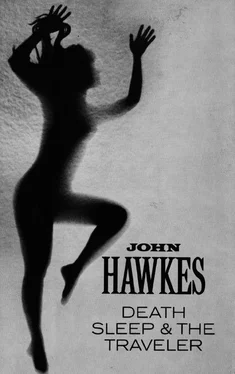We were crossing the pointed tip of the island, the goats were fading, I was standing directly behind Ariane who was pressed against the rail and against the flagpole, her small bare shoulders hunched in the intensity of her gaze.
I squinted at the disappearing island. I respected Ariane’s concentration and did not press the front of my body to the back of hers, but waited as she sighted across our wake toward the island blazing less and less brightly in the dark sea. The hair was blowing at the nape of her neck, the ends of her halter knot were blowing between the shoulder blades which my own two hands could have so easily cupped, concealed, shielded. However, it seemed to me that Ariane was elated but also desperate as she attempted to hold in view the brown earth and the remote and mournful goats, so that I did not press the front of my pants into the seat of hers, no matter how gently, or put my finger where the wind was stirring the fine hairs on her neck. At the stern where we were standing together but separated, it was impossible to hear the engines or any other sounds of the ship, because that was the area most engulfed by the crosscurrents of the wind, the singing of the dead wake, the thrashing of the great blades just below us and just beneath the frothing chaos of the surface.
“Well,” I said at last, “Fm glad you roused me for this event. It was an interesting sight. The abandoned goats, an island as bare as that one.”
Slowly, as if once more she had failed to hear me, or as if she could not admit that now there was nothing to see except the empty sky, the unbearable sunlight, the gun-metal gray reaches of the ocean that was both flat and tossing, slowly she turned around and revealed her face from behind the disfigurement of the black binoculars, and leaned back against the rail, looked up at me, smiled, spread her legs somewhat apart. Her expression was open, clear, inviting. I noted how dark her skin had become since the start of the journey.
“But Allert,” she said then, and her eyes were large, her teeth white, “the island we just passed belongs to me. Didn’t you know?”
“Do you wish to explain yourself?”
“I do. Yes, I do. But another time.”
Together we leaned on the rail and side by side stared at what we were leaving in our wake, which was nothing. But had I understood her meaning at that moment I would have bruised her in the agony of my desperate embrace.

The water comes down the surface of the glass, melting all vision. The water is an invisibly moving veneer of light on the black shale. The water is rearranging the pebbles that are so firm and white that they appear edible. The cold water spouts from the cleft in the rock, fills the tumbler, produces liquid weight in the earthen jar, emerges in cold bubbles from the bed of clay, sucks and gurgles through the moss, flows and drips and collects in the trees, the stream, the tall glass in my hand. And I drink it as I would breathe, letting it fill my oral cavity as it might a pool in the rocks, or I suck its freezing clarity against my teeth so that teeth and forehead ache with the cold. Or I hold it in the heavy pouch of my mouth and gulp it down, feel the clear cold water delivering itself to me drop by drop or in a steady transparent curve from silver spigot, brass tap, clay orifice with milky lips, and from the depths of frozen black trees. I wait, I drink, I consume the cold water beyond my usual capacity, making of myself a spongy reservoir, and teeth and gums and tongue and palate ache from the painful joy of this natural anesthetic. I feel that a spike has been driven into the back of my throat, my mouth is filled with the taste of white rocks and green ferns, I watch two large drops conforming to the laws of physics down the inside vertical space of the glass. And then I strike the match, grip the antithetical cigar between my front teeth, complete the cigar-lighting ritual — puffing, working the flame in slow wheels of light — and then at last the whitened tissues of my rinsed and empty mouth arc bathed in smoke, are bathed and flooded with the thick gray smoke that tastes stronger than ever, more than ever like rich manure dug in bright golden gobs from a deep bed. That foul but cherished smoke is to the vanished water as Caliban was to Ariel, both of whom existed but in the mind.

Sometimes I hear myself saying Ja-Ja-Ja quickly, silently, so as to put a little spunk — to use Ursula’s word — into my ponderousness. Ja-Ja-Ja I say to myself, and not even in Dutch.

“Allert,” she said, “I do not mind your girl friends. I do not mind their visits in our household. I do not mind when one of them spends a few hours or the night sharing with you the pleasures of the guest room bed. That’s all very well. In a way it’s enjoyable even for me. But I tell you, Allert, I refuse to have your friend Simone sitting on my handbag. How on earth could you fail to see? How could you fail to feel my mortification, my anger, and fail to pull her off by one of her innocent arms? I tell you, when I saw that woman sitting so ignorantly on all the intimacies of my own handbag, like a stupid chicken giving anal birth to my own uterine baggage, I tell you I began to question your judgment, your taste, even your motivations. I simply cannot have any woman putting her buttocks on my handbag. That she used her buttocks that way unconsciously is only the more insulting. So I trust we agree, Allert — no more Simone.”
While hearing out this monologue I found that I was generally in agreement with Ursula, since I had indeed noted the episode in question but had reacted to its symbolic message with inward pleasure and amusement, rather than with Ursula’s rage, for which I felt a certain additional shame while listening. But on the other hand, why did she have no sense of humor? And why did she leave her soft smooth leather handbag lying in the broad hollow of one of the sofa cushions precisely where poor Simone might be drawn unwittingly and might settle down upon it like some gentle victim on a land mine?
It was a trivial episode. And yet I was careful thereafter to make no jokes about Ursula’s handbag, while poor Simone never again lay naked and bathed in candlelight on our guest room bed.

Ursula was to me one woman and every woman. I was more than forty years old when we married, quite experienced enough to realize early in our relationship that Ursula was practical, physical, mythical, and that all the multiplicities of her natural power were not merely products of my own projections or even of the culture into which she was born — like a muted wind, a fist through glass — but to start with were engendered most explicitly in her name alone. Uterine, ugly, odorous, earthen, vulval, convolvulaceous, saline, mutable, seductive — the words, the qualities kept issuing without cessation from the round and beautiful sound of her name like bees from a hive or little fish from a tube. She has always been one woman and every woman to me because her attitudes have never been predictable, while minute by minute throughout the long years of our marriage her physical qualities have undergone constant metamorphosis from fat to lean, soft to hard, smooth to rough, lean to fat — languid urgent Ursula, who is leaving me.

“Allert,” she said, while masking her face with the smooth nightly glaze of thick white cream, “tell me the truth. Did you push her through the porthole as they accused you of doing?”
Читать дальше













